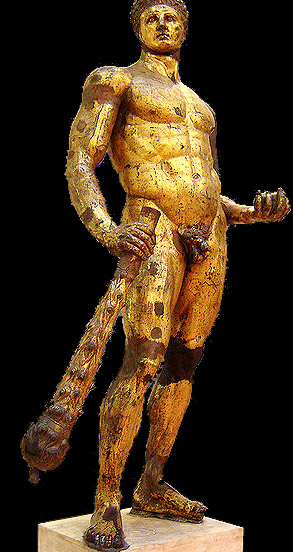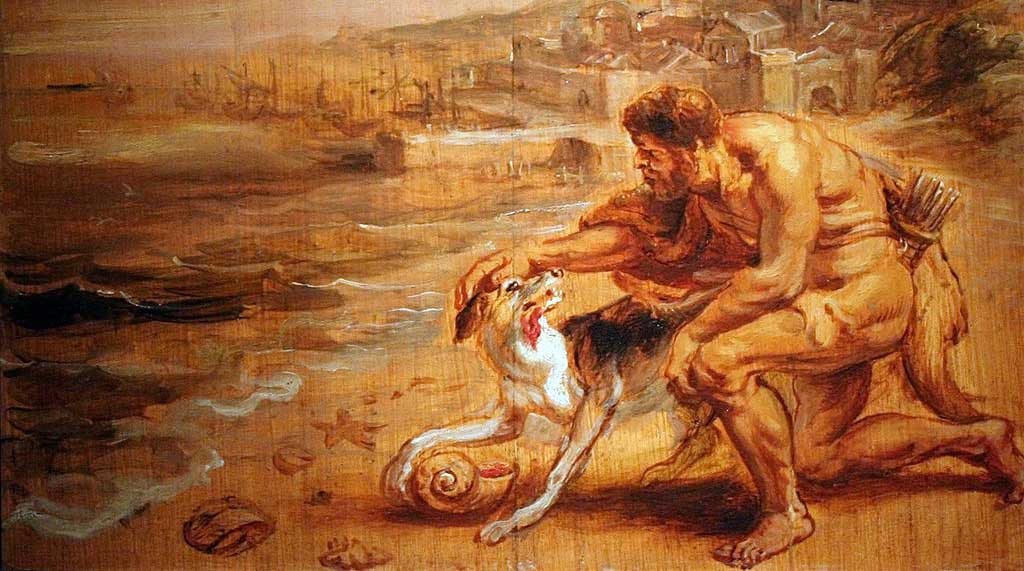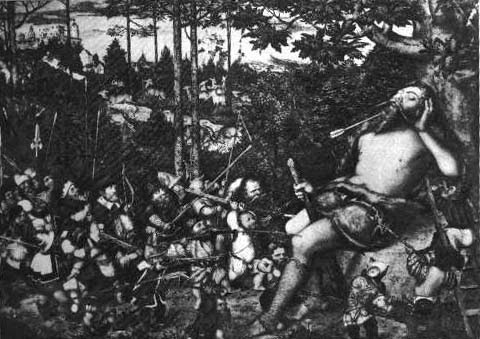Heracles
The most famous demigod known for his incredible strength and his mythical adventures, including the completion of the Twelve Labors.

Heracles stood out as the most famous and beloved hero in ancient Greek mythology, born to Alcmene and Zeus (disguised as Amphitryon). Although he was of the Perseid lineage through both of his parents, Heracles' heritage was associated with Argos. However, he was born in Thebes because his father, Amphitryon, had taken refuge there after fleeing from Tiryns. Heracles had a twin brother, Iphicles, but they did not share the same father. Zeus was the true father of Heracles, while Amphitryon was Iphicles' father.
According to Zeus's prophecy, Heracles was destined to become the king of Argos, as the first child born from the Perseids had a claim to the throne. However, Hera, seeking to avenge her rival Alcmene, sent Eileithyia to delay Heracles' birth by a month. At the same time, by hastening the birth of her nephew, Eurystheus, by two months, she made Eurystheus the ruler of Argos.

When Heracles was just eight months old in his cradle, Hera sent two enormous snakes to attack him. Despite his young age, the hero immediately seized and strangled the snakes. As he grew, Heracles became a robust giant, a strong and unruly young man. On one occasion, during a music lesson with his teacher, Linus, the teacher made a remark. Heracles responded with such force that he killed Linus with a powerful blow. As a result, Amphitryon decided to send him to Mount Cithaeron.
On this mountain, the hero initially lived a simple life as a shepherd until he reached manhood. There, he specialized in the art of archery. Later, his training was supplemented by renowned heroic figures who taught him the use of various weapons, as well as music and other skills. The sophist Prodicus mentions that during this period, Heracles faced a dilemma: to follow the path of Virtue or the path of Vice. Heracles chose the former. As a result, he lived a life filled with adventures and struggles, which ultimately led him to immortality.

At the age of eighteen, on Mount Cithaeron, Heracles defeated the lion that had been terrorizing the region. He then liberated Thebes from the tyranny of King Orchomenus, who had imposed oppressive taxes on its inhabitants. As a reward for this service, King Creon of Thebes gave him his daughter, Megara, as a wife. Some accounts say that Heracles had three children with her, while others claim he had eight. However, in a moment of madness inflicted upon him by Hera/Juno, his great enemy, he killed his wife and children. Once he recovered and realized what he had done, he sought atonement and consulted the Oracle of Delphi for guidance. The Pythia advised him to serve his cousin Eurystheus for twelve years. Thus, he completed the famous Twelve Labors over a period of eight years and one month. In addition, he performed other heroic deeds known as the Parerga.
The Twelve Labors:
- 01-The Nemean Lion
- 02-The Lernaean Hydra
- 03-the Golden Hind of Artemis
- 04-the Erymanthian Boar
- 05-the Stymphalian Birds
- 06-the Augean Stables
- 07-the Mares of Diomedes
- 08-Poseidon's bull
- 09-the Girdle of Hippolyta
- 10-the Cattle of Geryon
- 11-the Apples of the Hesperides
- 12-Cerberus
After Heracles completed his twelve labors, he returned to Thebes and then traveled to Oechalia in Thessaly. In this land, King Eurytus reigned and had a beautiful daughter, Iole. Eurytus had announced that he would marry his daughter to the one who won an archery contest against himself and his sons. Heracles won, but Eurytus refused to honor his promise. Therefore, the hero killed Iphitus, one of the king’s sons. He then asked Neleus, the king of Pylos, to purify him from this crime. However, Neleus refused, so Heracles killed him and all his sons, except for Nestor, who was absent. Because of the murder of Iphitus, Heracles was driven mad for the second time. For this reason, he sought advice from the oracle at Delphi. The Pythia refused to give a prophecy while sitting on the tripod. Then, Heracles decided to steal the tripod to take it with him and establish his own oracle. Apollo, who was sacred to Delphi, attempted to retrieve the tripod. A conflict nearly ensued between the god and the hero, but Zeus intervened and prevented it by throwing a lightning bolt. The two adversaries reconciled, and Apollo gave Heracles a prophecy regarding his atonement. He told him to sell himself into slavery for three years and to give the money he earned to Eurytus as compensation for the death of his son. In this way, he would be freed from his madness. Thus, Heracles was sold to Queen Omphale of Lydia.

During this period, Heracles performed many other heroic deeds, as the ancient Greeks say:
Heracles imposed his punishment on the Cercopes, a race of dwarf bandits. In Lydia, he confronted and killed the robber Sylaeus and his daughter Xenodice. Additionally, he threw the bloodthirsty Lytierses, who was the illegitimate son of the Phrygian king Midas, into the river Maeander.
In Aetolia and Trachis, regions near Mount Oeta, Heracles experienced the final adventures of his life.
Heracles and Deianira – The Death and Apotheosis of the Hero